Coffee: What Goes into Each Cup?
For many professions, it’s easy to imagine how the daily routine might go. But when it comes to organic coffee farming, the journey quickly becomes an unimaginable labyrinth of risk, strenuous labour and uncertainty. The effort that the labour demands to bring us our morning brew is astounding, at a time when those not compensated with Fair Trade wages suffer being largely underpaid.
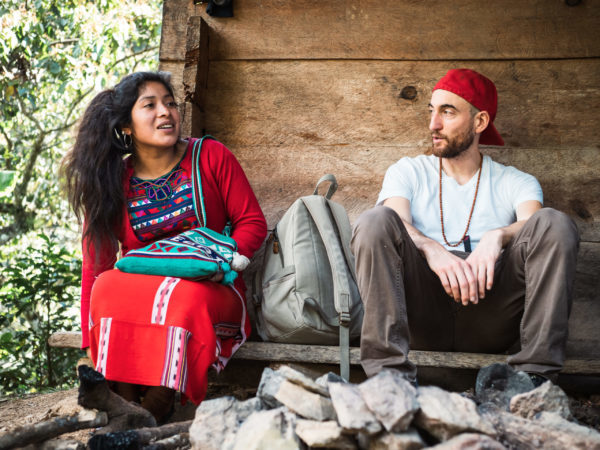 Coffee shareholder Juana and coffee program lead Lawrence sit together at a rest station in the coffee plantation
Coffee shareholder Juana and coffee program lead Lawrence sit together at a rest station in the coffee plantation
Coffee growers deserve recognition and security for the work that they do. Appreciating this, Barefoot College International and Mayan Mountain Coffee offer farmers dignified wages for their beans while also providing inclusion and transparency to their overarching model. They also train Indigenous farmers on how to transition into organic practices while upholding regenerative values.
I had the immense privilege of experiencing first-hand the coffee farming journey in a remote rural community in Guatemala during harvest time. Juana, our host, manages the coffee coop and is a stakeholder in the Mayan Mountain enterprise (She is also a solar master trainer for our women solar engineer curriculum and is integral to all of our national operations). It was an experience that will stay with me forever, and keep me cherishing every cup of coffee I drink for the remainder of my days.
The remote village of Xecotz is home to a coop of Indigenous women coffee farmers who meet to discuss agri-livelihood strategies collectively. Unlike many Guatemalan growers, they receive fair wages for their harvests and have a support system that allows them to make more informed decisions as a group. At an elevation of just below 2000 metres, Xecotz enjoys breathtaking views of the surrounding mountains and year-round mild temperatures that never fall below freezing.
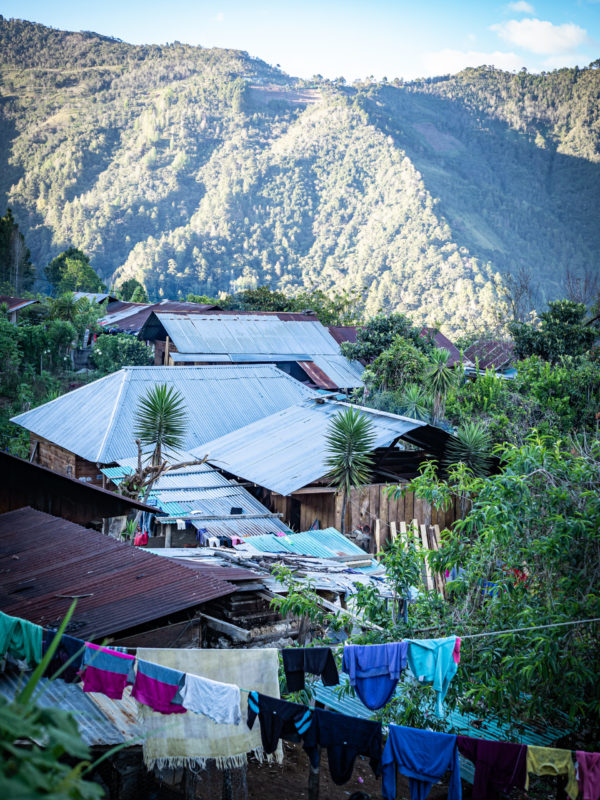 The village of Xecotz lies in a remote mountainous region of rural Guatemala
The village of Xecotz lies in a remote mountainous region of rural Guatemala
The temperate climate, frequent sunshine and abundance of rainfall for large parts of the year are ideal for coffee plants. The soils are rich in nutrients and contain a quantity of acidity that coffee plants adore. Thus they naturally thrive in these conditions, producing highly coveted, flavourful arabica beans that are exported worldwide. Coffee has fuelled Guatemala’s economy for more than a century and today accounts for over 40% of agri-livelihood income.
The 500-Metre Descent
However, the village of Xecotz is too high up for coffee plants- the beans won’t grow in their backyards and rather must be cultivated down the steep mountainside. Beans grow best between 1500 and 900 metres. So down we went, descending more than 500 metres to visit Juana’s coffee plantation, situated among dozens of other farmers’ lots.
The sharp decline had me wondering how I’d get back up without serious effort in the hot sun. I’m in awe that each day during harvest time (a few weeks annually), the farmers make the hike daily to ensure that everything goes smoothly. When Juana gets to work picking the beans from the stalks, the steepness of the hills causes her to hold onto the plant’s branches for added footing around the cliffsides. There is no health insurance for the coffee farmers.
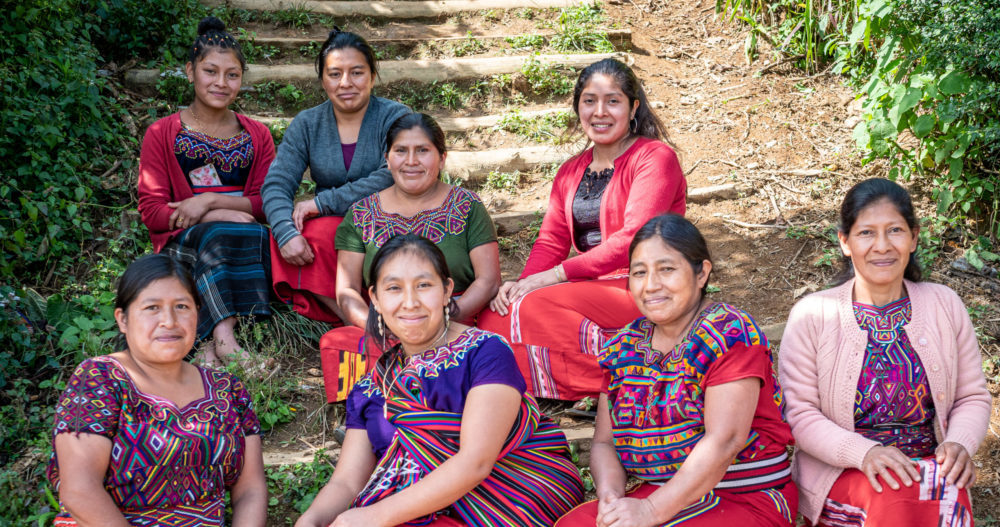 Pictured: The Xecotz Women’s Coffee Cooperative
Pictured: The Xecotz Women’s Coffee Cooperative
After the red fruits are harvested, additional steps are required to process them into the beans we know as coffee. The pulp must be extracted next, then rinsed off and fermented before heading to a patio space, where they are set to dry in the heat of the sun. Next, a mule or horse is hired to transport the beans up the mountain, where they can be packaged or sold in their parchment form. Roasters and cafés will later do the work of preparing them for consumption.
An Indigenous Women-Led Coffee Cooperative
Our journey back uphill is slow and steady- any speedier and exhaustion would surely have set it. Back in the village of Xecotz, I bear witness to a meeting between about 10 women coffee farmers, who are able to discuss harvest-related inquiries, thoughts and concerns amongst themselves, and welcome potential new members. The backed security of a women’s co-op enables a greater level of trust, understanding and collaboration.
Together, the women could resolve potential challenges including pests, poor weather, land erosion, changes in climate and sudden price shifts within the coffee market. Fair wages provide more stability than regular markets, which are rife with volatility, often without any given explanations to the farmers who toil tirelessly to bring those beans to market.
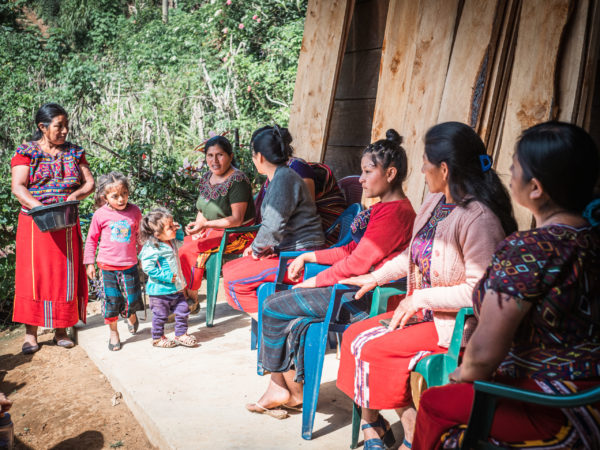 The Women’s Coffee Cooperative discusses the harvest and their next steps together
The Women’s Coffee Cooperative discusses the harvest and their next steps together
All of the combined demands of coffee bean production might have some wondering- what do fair wages provide these farmers who work so hard? Farmers who receive fair wages for their coffee earn around double what the average price is on the market. It also adds protection from the volatility of the market as the compensation does not fluctuate so extremely.
Striving for Fair Wages and Sustainable Practices
For example, today’s prices have dropped by 26% compared to the same time last year, and yet ours only dropped by 6%. We outperform the certified fair trade purchasers every year by at least 20% and yet our research is telling us it’s still not enough to compensate farmers for their work and additional costs. Our mission is to continue improving our policies and pay rates.
Because organic beans are highly prized in the current market, their higher sale price incentivizes the farmers to operate using better, more regenerative practices and responsible land stewardship. This in turn keeps the soils and lands healthier and certainly helps to reduce threats such as landslides, pests and drought. When fertilizers are avoided and non-gmo coffee plants are used, their strength and resilience are evident.
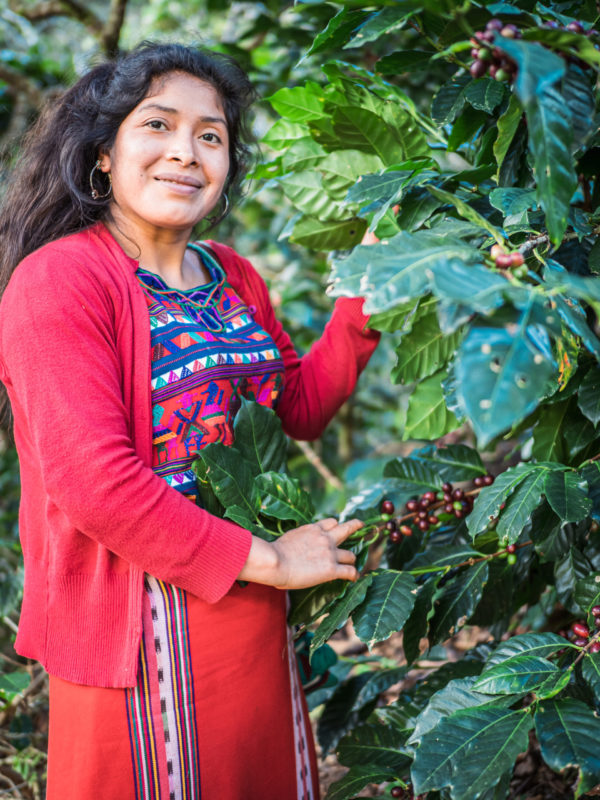 Juana poses with a coffee plant that is nearly ready for harvest
Juana poses with a coffee plant that is nearly ready for harvest
We passed by a struggling plot of land where non-organic coffee plants, limp and spindly, were nearly fruitless and leafless after only one year of growing without a farmer’s support. Where fertilizers were no longer provided, the plants were helpless and could no longer thrive without intervention. The organically-grown specimens on Juana’s plot were far heartier and likely more resilient to changes in the weather and pests.
The traceability of our coffee is important to us; we are proud to offer fairly purchased beans from producers that we have met in person and whose plantations we visit frequently and maintain a mutual relationship with. We follow the journey of both the coffee beans and the farmers closely to ensure that holistic land stewardship and regenerative agri-forestry practices are maintained.
A Global Movement for Fairly-Grown Coffee
Back in the Western world, I sit and enjoy a warm cup of coffee on a drizzly Spring morning. Knowing much more than I once had, I ponder deeply about the processes and steps it took to get this prized resource imported all the way to my local café.
I think about the future of coffee and the entire supply chain that enables me to enjoy this wonderful product each day. I know I won’t be taking coffee for granted any time soon. My hope is that others will also discover how special it is to drink coffee around the world, even if they’re not scaling the hazardous mountains of the remote Guatemalan terrain to see the lengths to which our growers go every year.
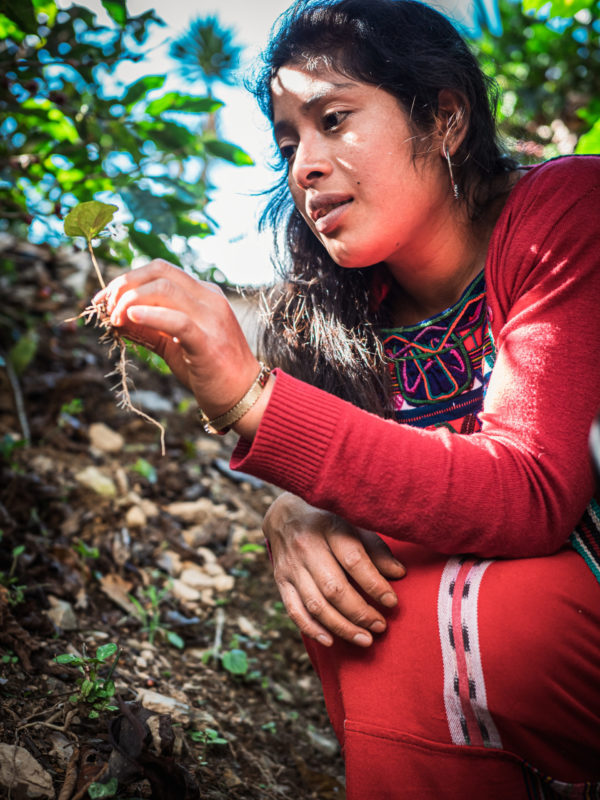 Juana holds a coffee plant seedling; a symbol of potential and new beginnings
Juana holds a coffee plant seedling; a symbol of potential and new beginnings
You can support this program by donating to Barefoot College International.

